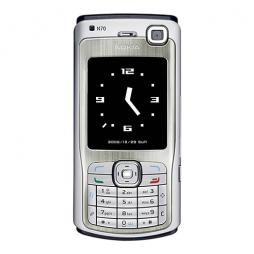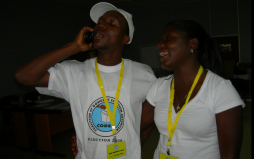voting
Posted by AnneryanHeatwole on Oct 03, 2011
Today's Mobile Minute brings you coverage on the future of QR codes in the upcoming U.S. elections, a GSMA study on the effects of cutting mobile taxes in Africa, a look at how Americans prefer to use their mobile phones, the growth of mobile money transfers in Uganda and the world, and a roundup of whom to follow on Twitter for ICT4D and M4D news.
- Mashable investigates how QR codes could be used in the upcoming 2012 U.S. elections. Ideas include organizing field operations, soliciting donations, encouraging celebrity endorsements, cross-promoting the election through merchandise sales and social media, and using QR codes to reach out to new voting blocks during get out the vote drives.
- The GSMA recently released their preliminary findings from research on mobile phone taxation in Africa. The research is still ongoing, and will have a global focus when the final results are released, but the information from Africa shows how lower taxes on handsets can lead to an increase in mobile ownership – in Kenya, after the value added tax on handsets was cut by 16%, sales increased by 200%.
- CNN reports that the popularity of SMSs as the primary means of mobile communication in the United States is rising, while voice call preference is dropping. From a study from the Pew Internet and American Life Project, 53% of Americans still prefer voice calls to SMS, while 31% prefer SMS to calls, and 14% said their preference was flexible depending on the situation. The study also found that 27% of mobile owners never use SMS, so voice is still the leading way to communicate via mobile in the US despite the growing popularity of SMS (only 4% of survey respondents said they only use their phones for SMS and never voice calls).
- In Uganda, mobile payments and mobile money transfers are taking off. According to Business Week, Ugandan telecom MTN reported that they passed more than $200 million in mobile money in August 2011. In related news, The Times of India reported on a new projection from the Ernst & Young consultant firm that estimates that by 2014, roughly $245 billion will be transfered via mobile payments systems worldwide.
- Interested in global development and want to learn more through Twitter? The Guardian has a roundup of twenty Twitter users who tweet about global development, ICT4D, M4D, global change, and good aid practices. If you're looking to follow some new people on Twitter, this is a good start.
[Mobile Minute Disclaimer: The Mobile Minute is a quick round-up of interesting stories that have come across our RSS and Twitter feeds to keep you informed of the rapid pace of innovation. Read them and enjoy them, but know that we have not deeply investigated these news items. For more in-depth information about the ever-growing field of mobile tech for social change, check out our blog posts, white papers and research, how-tos, and case studies.]
Image courtesy Flickr user QiFei
Posted by admin on May 31, 2010
Recently, we’ve been seeing a lot of hype about citizen reporting with mobile phones during elections. It is often conflated with the term “election monitoring,” but this does a disservice to both citizen reporting and election monitoring, a discipline and field that has been around for some 20 years. These two approaches have markedly different goals, target audiences, and processes. We think it is time for readers to definitively understand what election monitoring is in contrast to citizen reporting, and what the role of mobile phone and mapping platforms are in regard to these two very different forms of engagement during elections. We aim to clearly differentiate between them once and for all.
We also urge the adoption of differing terms - citizen reporting during an election versus systematic election monitoring. Mobile phones, SMS, and mapping platforms play a role in both citizen reporting and election monitoring, of course.
Posted by AnneryanHeatwole on Sep 11, 2009
Polls (Pollimath) data sheet 2299 Views
Organization that developed the Tool:
Problem or Need:
Polls by Pollimath can present a target audience with a list of choices, obtain statistical insight, and help with democratic decision making.
Brief Description:
Polls, a mobile tool developed by the company Pollimath, is an Android mobile-phone software used to conduct opinion polls. The concept is simple; draft the opinion poll on a phone, add voters, and open the poll. The list of voters will receive an SMS and/or E-Mail notification with a web browser link in it. Users vote via a lightweight web page that opens up on clicking the link in the notification. The pollster can see the poll statistics and the voting details.
Tool Category:
App resides and runs on a server
Key Features :
- User friendly
- Choice of poll delivery channels
- Centralized, easily-referenced poll results
Main Services:
Voting, Data Collection, Surveys, and Polling
Number of Current End Users:
Number of current beneficiaries:
Handsets/devices supported:
Reviews/Evaluations:
http://androinica.com/2009/01/25/app-review-polls-gets-answers/
Is the Tool's Code Available?:
Is an API available to interface with your tool?:
Posted by LeighJaschke on Jul 14, 2009
Generation 2.0 A Practical Guide for Using New Media to Recruit, Organize, and Mobilize Young People data sheet 3109 Views
Author:
Rigby, Ben; Godin, Seth; Exley, Zack
Abstract:
This practical guidebook is a must-have for every nonprofit and political organization interested in reaching youth. The book clearly and concisely details the ways in which new media has been used successfully –and unsuccessfully– to recruit, organize, and engage young people. Importantly, it ties online efforts to offline action. Chapter 4 focuses on mobile phones, using sms text messaging, what it is, how it works, and how to get started.
Posted by KatrinVerclas on Mar 22, 2006

This campaign is powered by Mobile Voter and MobileActive Ben Rigby, supported by the Pew Charitable Trusts.



